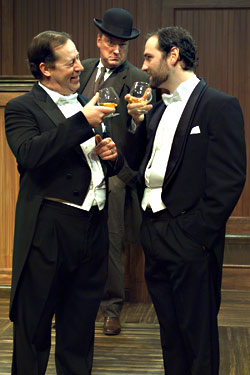Everything about Taproot’s production of An Inspector Calls (through Sat., March 4; Taproot Theatre, 206-781-9707, www.taproottheatre.org) suggests the butler did it. Everything, that is, save the butler—there isn’t one (there is a maid). Nonetheless, J.B. Priestly’s play, set in central England circa 1912, has all the outward trappings of a classic British whodunit: the sudden, mysterious death of an enigmatic individual, the secretive, upper-middle-class family ensconced in a drawing room, and, of course, the coy and charismatic inspector whose investigation proceeds by some indecipherable internal logic. This is the realm of Hercule Poirot, a miasmic environment seething with ulterior motives and dark psychology.
But Priestly, it turns out, is just playing with us. First, the corpse at the center of this play is a suicide—a young woman whose desperate circumstances drove her to ingest a killing chemical solvent. Initially, news of her untimely demise has little effect on the assembled Birling family; it’s a sad affair, no doubt, but of little concern. Not until the aptly named Inspector Goole (wonderfully played by Don Brady) begins his inquiries do we realize a different species of guilt is being pursued here. Call it the butterfly effect. As Goole’s odd and menacing work proceeds, it comes to light that, one by one, each Birling inflicted some social slight upon the deceased, until the accumulated neglect and abuse pushed the woman into abject despair.
Directed by Taproot artistic director Scott Nolte, An Inspector Calls is one of five “favorite” plays being produced this season to celebrate the company’s 30th anniversary (Taproot first staged it in 1991 on a shoestring budget, in an elementary-school lunchroom). As such, the play doubles as a sort of mission statement, an assertion of Taproot’s artistic and social identity. As Nolte writes in his director’s notes, “The prophetic cautions of the story ring with insight that’s still relevant and inescapable,” especially in this technological age of instant connectivity and spontaneous media access. In other words, this is a timely piece of theater, and Nolte does a fine job of balancing the play’s strong social content with other dramatic requirements. The show works both as an old-fashioned thriller and a challenging investigation of social responsibility.
The casting, in particular, is nearly perfect. At the play’s heart is the strange, existential inquisition of Inspector Goole, and Brady hits just the right note of menace and mischief in his portrayal of this ephemeral gadfly. With his piercing eyes, imposing frame, and slow, deliberate gait, he moves imperceptibly from compassion to intimidation as he confronts his suspects. Robert Gallaher and Pam Nolte seem to have great fun as Arthur and Sybil Birling, the parents of this insensitive clan and models of furious ignorance and denial. Jesse Notehelfer as daughter Sheila gives the play a moral counterweight. She’s not only the least guilty but the quickest to understand the consequence of her actions, and her fierce, intense gaze burns through the thick smoke screen thrown up by the rest of her family. The always excellent Kevin Brady plays Sheila’s fiancé, Gerald Croft, a proper, ambitious young man who senses his world crumbling at his feet, and Sam Wilson is convincing as the profligate son, Eric, a sensitive kid numbing his mind through nightly debauchery. What a family.
There’s good reason Taproot’s lasted 30 years. Their productions are consistently high-quality, mounted and staged with obvious care and love of the theater. Even when they misstep, they do so with the confidence of their convictions, always in good faith. They might not be winning any awards for experimentalism, yet Taproot’s choices reflect a desire to challenge their audience’s collective conscience. An Inspector Calls is an excellent tribute to this winning approach.








